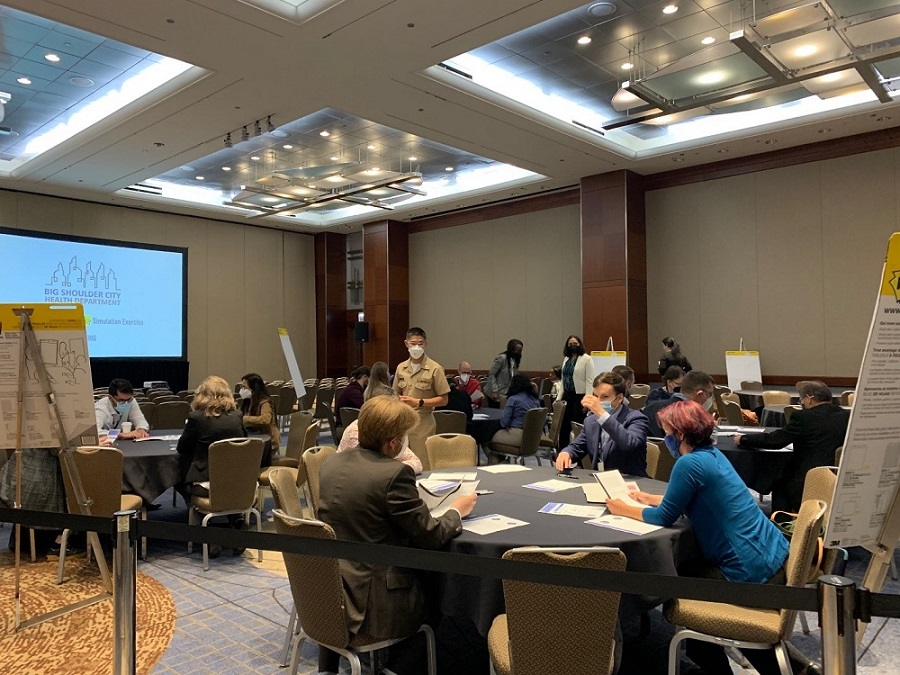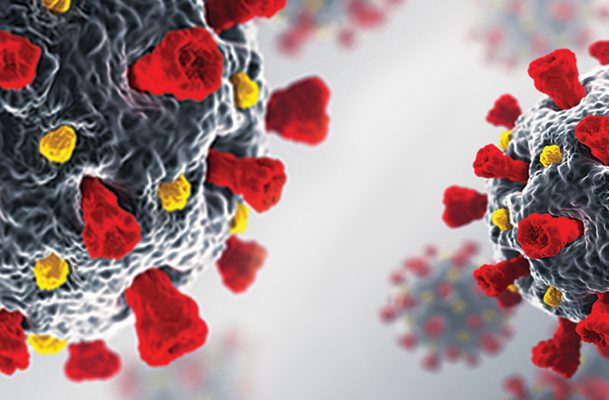Government Relations
Funding and Policy: Science and Policy Intersect in Public Health Program at APS 2022

Photo Above: APS attendees roleplay members of the hypothetical Big Shoulder City’s public health department.
The APS Annual Convention is increasingly a go-to venue for learning about the ways that psychological science and policy cross paths in governments around the world. Headlining science policy programs at APS 2022, held in Chicago in late May, was a special panel organized by U.S. government scientists and behavioral research experts on public health and vaccine policy.
“Leveraging Psychological Science to Promote COVID-19 Vaccine Uptake During a Public Health Emergency” brought together representatives from the U.S. Centers for Disease Control and Prevention (CDC), the National Institutes of Health, the Chicago Department of Public Health, and the university research community to discuss how psychological science has been used throughout the COVID-19 emergency, focusing on the science of vaccine uptake. The event was organized by Neetu Abad and Elisabeth Wilhelm, members of the Demand for Immunization Team within CDC’s Global Immunization Division.
Psychological science in the service of vaccination uptake
The special vaccination session was divided into two segments. In the first, APS attendees heard from the assembled experts in a traditional symposium. APS Fellow Noel Brewer (University of North Carolina at Chapel Hill) reviewed a theoretical framework for increasing vaccination rates and discussed ways that behavioral science has been integrated into existing vaccine policy. A recent article in APS’s Psychological Science in the Public Interest (PSPI) by Brewer and colleagues introduced this framework (Brewer et al., 2018). This article established a model of vaccination uptake that has since been adapted by the World Health Organization (WHO) in guidance it issued in 2021. The work to inform vaccination policy through behavioral science, spurred by the PSPI issue, continues through a WHO working group on the behavioral and social drivers of vaccination.
Learn more about APS’s advocacy efforts on the APS Government Research, Funding, and Policy page.
Next, APS Fellow Gretchen Chapman (Carnegie Mellon), another coauthor of the PSPI article, presented the results of field research studies that have helped build or affirm the foundation for the frameworks Brewer discussed. Over a variety of experiments, Chapman’s work has investigated the real-world effects of interventions targeting social norms and motives, messaging around vaccine “ownership,” and incentives or mandates to receive vaccines. This research has shown that even some of psychological science’s best interventions for increasing vaccination uptake may have small effects—specifically, increases of 1 to 4 percentage points. Those strongest possible interventions include vaccine mandates and guaranteed incentives for receiving a vaccine, she observed.
The next two presenters focused on ways that behavioral science has been integrated into government vaccine strategy. Psychological scientist Christopher Voegeli, insights lead for CDC’s Immunization Services Division, reviewed CDC’s strategy to reinforce confidence in COVID-19 vaccines. The “Vaccinate with Confidence” strategy aims to build trust, empower healthcare personnel in their decisions to get vaccinated and recommend vaccination, and engage communities and individuals in two-way communication. This effort has helped CDC establish a set of 12 vaccination strategies for communities. After Voegeli’s presentation, attendees were treated to a presentation by public health expert Jacqueline Tiema-Massie, the immunization program director for the city of Chicago. Tiema-Massie reviewed Chicago’s approaches to increasing vaccine uptake and described the strategies she and her colleagues use to encourage vaccination among different key groups, such as students, seniors, and parents. These strategies rely on a mix of behavioral science and marketing insights to achieve success in increasing vaccination.
After the presentations, psychological scientist William Klein, who leads the National Cancer Institute’s behavioral research program, provided a set of comments for discussion. He blended his experience as both a university scientist and a federal scientific leader to help psychological scientists understand the broader context and challenges of applying psychological science to policy.
APS attendees put to the test
The fun really began for session attendees, though, as the symposium panel ended and participants broke out into small groups. Wilhelm and colleagues led an engaging simulation of what it is like advising health policy in a city public health department. They first heard a briefing about the fictitious “Big Shoulder City”—a city similar to Chicago that was not meeting its vaccination-rate goals. Working in teams, participants reviewed materials in a dossier on Big Shoulder City’s residents, vaccination rates, and more. The packet intentionally contained more information than participants would reasonably be able to process. While under time pressure, attendees were asked to synthesize this information, identify areas where new data were needed, and make recommendations on how to increase vaccination rates.
As it does in real life, however, information changed. Participants heard of a cut to the hypothetical health department’s budget—similar to what can happen in the real world—and were asked to tailor their recommendations to do more with less money.
When time for the simulation wrapped up, participants presented their ideas to Big Shoulder City’s immunization program director—a role ably filled by Tiema-Massie. Although most presentations made use of behavioral science expertise and knowledge, nearly all contained gaps and limitations caused by the session’s intentional time pressures and knowledge gaps.
As the full session came to a close, the group with the top set of recommendations, as judged by Tiema-Massie, walked away with special Chicago swag as a prize. But all participants left with increased insights and awareness about the many ways that behavioral and social sciences can contribute to vaccination uptake and other public health issues—and the day-to-day challenges faced by those working to put behavioral science into practice.
Sorry that you missed this exciting event? APS will continue to bring members and other interested individuals science and policy programs at future conventions and virtually throughout the year.
Related content we think you’ll enjoy
-

APS Global Collaboration on COVID-19
Six working groups explore how psychological science can more effectively inform solutions to pandemics.
-

PSPI Live
This online symposium series takes a deeper look at important papers published in the APS journal Psychological Science in the Public Interest.
-

New Report Finds “Gaps and Variation” in Behavioral Science at NIH
A new NIH report emphasizes the importance of behavioral science in improving health, observes that support for these sciences at NIH is unevenly distributed, and makes recommendations for how to improve their support at the agency.
Feedback on this article? Email [email protected] or login to comment.





APS regularly opens certain online articles for discussion on our website. Effective February 2021, you must be a logged-in APS member to post comments. By posting a comment, you agree to our Community Guidelines and the display of your profile information, including your name and affiliation. Any opinions, findings, conclusions, or recommendations present in article comments are those of the writers and do not necessarily reflect the views of APS or the article’s author. For more information, please see our Community Guidelines.
Please login with your APS account to comment.